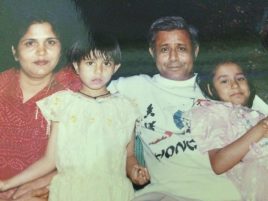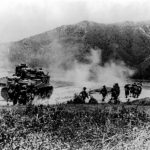The Daughter Of A Disabled 1971 War Veteran Questions Those Who Point Fingers At Our Soldiers
My father, Major Sujeet Kumar Pancholy, was a war hero. He fought in the 1971 Indo-Pak war when he was 24 years old. As a newly commissioned officer in the Army, with brilliant hopes for a brighter future, all he wanted to do was serve his motherland.
But, life had other plans. On the fateful night in May, at the peak of the war, he got seriously injured in a grenade blast in PoK’s Lipa Valley (some of you know may now know this area owing to the recent surgical strikes by India).

For three days my father remained unconsciousness and buried under a thick cover of snow. He was rescued by two brave Sikh soldiers of his regiment.
My father always said that a Sikh never removes his turban, but the brave hearts of my father’s unit, the mighty 9 Sikh, did the other way. They opened up their turbans to make a stretcher to ferry my father.
What followed was five years of hospitalisation, innumerable surgeries and an eventual discharge from the service with several vital organs cut into half.
When you are disabled at such an early age, the future appears bleak, especially when you are unmarried. Yet my mother and he met and they decided to marry. Post marriage when my mother visited her in-laws, there was an inevitable question pending for her to answer. In a very soft tone, her sister-in-law asked my mother, ‘Why did you marry a disabled person?’ The question rang a bell in my mother’s mind – ‘how uncompassionate people can be’, she thought. Being an Indian bahu she suppressed her annoyance and replied in a polite tone, ‘Because I love him, not his past.’ That was the first jibe my mother faced because of my father’s decision to serve his motherland.

As disabled officer’s children, my sister and I had to face such questions often. There were people who thought that my father was mad to join the forces, there were others who said that he “went for it” and then there were some who appeared to be indifferent to it.
Thankfully my father was a brave man who was able to look past these silly comments and made all the efforts to raise us in a disciplined manner.
Today, when I read the comments of a very prominent and mature Bollywood actor, I find myself sailing into the past once again. The same remark “he went for it” keeps flashing before my eyes. And then I hear those comments of our Bollywood “heroes” and politicians who say that the men in uniform get free ration.
Yes, I am married to an army officer myself and I eat free ration, but let me tell you about the roti that I eat.
I eat that roti with a fear that my husband is standing on the border, battling with snow and dodging bullets for us. I eat that roti with the hope that he and his men will return safely to us to enjoy that ration in the comfort of our homes. I eat that roti with a prayer that there should not be any conflict. I eat that roti with a mind full of uncertainty.
Yes, our soldiers are mad – to such an extent that they live for their nation and its sovereignty. Yes, they “went for it” – because there was no one else who opted for it. Yes, they deserve free ration – it is the least a nation can do for them.

The sad truth is that many of us think of our soldiers only when there is war. The fear of losing our own life or that of a loved one is so prominent that we start thanking our soldiers. But who is thinking about a soldier’s life? Apparently, no one.
When a soldier is martyred, an entire family dies. There is no monetary benefit that can heal the wounds of that family. When a soldier becomes disabled, a family dies every day. Each day, someone will scratch upon the wound of disability and dash the hopes of the family.
We are happy to celebrate when India wins against Pakistan in a cricket match and shower the cricketers with cars and truckloads of money, but when a soldier demands his rights, we make them remember that they eat free ration.
If free ration is such a lucrative incentive, then why don’t the ministers and their children join the forces? Why don’t we see any of these actors visiting Siachen and staying there for a week? Why don’t we see them crawling in the dense jungles to counter the insurgents?
The answer is that they are not mentally fit for such service. Military training provides physical fitness, but mental fitness is what you are born with.
So next time when you see a soldier, please walk upto him or her and thank them for their contribution. They need our blessings more than anyone else.
Note: My father lost his battle with cancer in 2011. The injuries sustained in war had become malignant. My family and I wish to thank the Indian Army for providing for his entire treatment.
Credit : www.topyaps.com






Great Bhagyashree (Y)….hats off to your dad & proud of u that u shared such an inspirational truth….got tears in my eyes reading this article…..I even belongs to an army family & can understand the things that u wanted to share through your writings….keep writing & doing the great initiative in favour of Indian Army
A deep and poignant post! It is because of soldiers and officers, like your father, that my family and I eat our rotis in the comforts of our home. We are ever grateful to the men and women of our armed forces. Jai Hind!